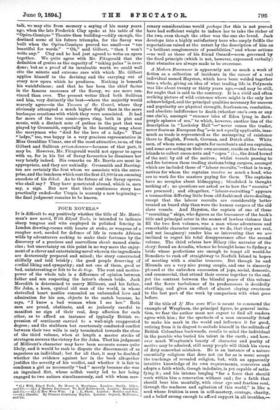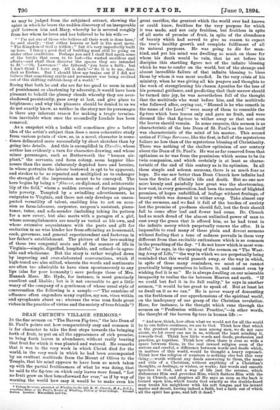FOUR NOVELS.*
IT is difficult to say positively whether the title of Mr. Merri- man's new novel, With _Edged Tools, is intended to indicate sharp tongues and wits employed in polished fencing in London drawing-rooms with hearts at stake, or weapons of a rougher sort, needed for defence of life in remote African wilds by adventurers seeking to make their fortunes by the discovery of a precious and marvellous shrub named simia- cine ; but uncertainty on this point in no way mars the enjoy- ment of a clever and entertaining novel wherein the ingredients are dexterously prepared and mixed; the story constructed skilfully and told briskly ; the good people deserving of cordial liking and sympathy; and not one of them, good or bad, uninteresting or felt to be de trop. The root and motive- power of the whole tale is a difference of opinion between father and son respecting the latter's chosen bride. Jack Meredith is determined to marry Millicent, and his father, Sir John, a keen, cynical old man of the world, in whose shrivelled heart nestles concealed an unbounded love and admiration for his son, objects to the match because, he says, "I know a bad woman when I see her." Both men are proud, obstinate, and so jealously careful to manifest no sign of their real, deep affection for each other, as to afford an instance of typically British re- pression of sentiment carried to a well-nigh exaggerated degree; and the stubborn but courteously conducted conflict between their two wills is only terminated towards the close of the third volume, when at length a master stroke of stratagem secures the victory for Sir John. That his judgment of Millicent's character may have been accurate seems quite likely, and it would be rash to dispute the discernment of so sagacious an individual; but for all that, it may be doubted whether the evidence against her in the book altogether justifies the severity of his verdict, and whether it is fair to condemn a girl as necessarily " bad " merely because she was an ingrained flirt, whose selfish vanity led to her being engaged to two suitors simultaneously, and with whom mei.- • (1.) With Edged Tools. By Henry S. Merriman. London : Smith, Elder, and (lo.—(2.) A Modern Buccaneer. By Rolf Boldrewood. London : Macmillan and Co.—(3.) If Men Were Wise. I r 71. L. Shew. London : Bentley and Son. —(4.) Claudia. By Frances Conrtenay Baylor. London: Osgood, Mel:Wane, and Co.
cenary considerations would perhaps (for this is not proved have had sufficient weight to induce her to take the richer of the two, even though the other was the one she loved. Jack develops into a highly satisfactory hero who amply fulfils the expectations raised at the outset by the description of him as "a brilliant conglomerate of possibilities," and whose actions —as well as those of his friend Oscard—seem governed by the fixed principle (which is not, however, expressed verbally) that obstacles are always made to be overcome.
A Modern Buccaneer is apparently not so much a work of fiction as a collection of incidents in the career of a red individual named Hayston, which have been welded together into a whole, giving an idea of what trading life in Polynesia was like about twenty or thirty years ago,—and may be still, for aught that is said to the contrary. It is a vivid and often striking picture of wild existence where might is the only law acknowledged, and the principal qualities necessary for success and popularity are physical strength, fearlessness, resolution, and absolute indifference to death (whether one's own or any one else's), amongst "summer isles of Eden lying in dark- purple spheres of sea," to which, however, another line of the description in " Locksley Hall "—" never comes the trader, never floats an European flag "I—is not equally applicable, inas- much as trade is represdnted as the mainspring of existence there to English, French, German, and Dutch alike. White men, of whom some are agents for merchants and sea captains, and some are acting on their own account, reside on the various islands to collect cocoa-nuts and " copra " (i.e., the dried kernel of the nut) by aid of the natives; whilst vessels passing to. and fro between these trading stations bring cargoes, amongst which are included those of "labour recruits,"—that is to say, natives for whom the captains receive so much a head, who. are to work for the masters paying for them. The captains have no scruples about kidnapping ; bloodshed is thought nothing of ; no questions are asked as to how the "recruits are procured ; and altogether, " labour-recruiting " appears a transaction differing little from old-fashioned slave-dealing, except that the labour recruits are considerably better treated on board ship than were the human cargoes of the old slave vessels. And Hayston, the captain of one of these " recruiting " ships, who figures as the buccaneer of the book's title and principal actor in the scenes of lawless violence that fill the two first volumes, was a man whose adventures and remarkable character (assuming, as we do, that they are real, and not imaginary) render him so interesting that we are. inclined to regret his total disappearance after the second volume. The third relates how Hilary (the narrator of the story) found an Arcadia, whence he brought home to Sydney a bride whose perfections are enough to tempt all would-be Benedicts to rush off straightway to Norfolk Island in hopes of meeting with a similar treasure. But though he and Miranda are a very nice young couple, and one is sincerely pleased at the unbroken succession of joys, social, domestic., and commercial, that attend their coarse together to the end, yet the contrast between the blissful peace of this volume and the fierce turbulence of its predecessors is decidedly startling, and gives an effect of almost cloying sweetness to the last part of the work by comparison with what goes before.
If the title of If Men were Wise is meant to commend the example of Wrayburn, the principal figure, to general imita- tion, we fear the author must not expect to find all readers agree with him ; for the spectacle of a man unusually fitted to make his mark in the world and influence it for good, retiring from it in disgust to seclude himself in the solitude of British Columbian backwoods, recalls to mind the individual in the parable who buried his talent in the earth ; and how- ever much Wrayburn's beauty of character and purity of motive may be admired, still many people will think his views of duty somewhat mistaken. He is an instance of a nature essentially religions that does not (as far as is seen) accept the teachings of revealed religion, bat, with an apparently intuitive knowledge of its own requirements, conceives and adopts a faith which, though indefinite, is yet capable of satis- fying it ; and his intense longing "for a force that should work within him a renovation without end ; for a faith that should bear him manfully, with clear eye and fearless soul, through the madness and agitation of this world," is like a. seed whose fruition is seen in self-mastery, courage, charity, and a belief strong enough to afford support in all troubles,—
as may be judged from the subjoined extract, showing the spirit in which he bears the sudden discovery of an insuperable
gulf between him and Mary, whereby he is severed roughly from her whom he loves and has believed to be his wife :— " I'm not one of those who believe all their work is done here,' he said slowly ; 'that either heaven or hell is the next move. "The Kingdom of God is within ; " but it's very imperfectly built up here. I fancy a good deal of building must still be going on under other conditions. Perhaps you and I shall find again some of the bricks that seem to be lost—the wasted sacrifices and efforts—and shall then discover the spaces they are intended to fit.'—' Oh,' Lawrence ! ' she faltered, you have a faith ; but I don't think I have any. All is dark.'—' So it is to me, dear, dark as Erebus. But I should blow my brains out if I did not believe that something stable and permanent was being evolved out of this shifting rubbish-heap of a world.'"
Seeing that both he and she are far too good to seem in need of punishment or chastening by adversity, it would have been pleasant to behold the gloomy clouds whereby they are over- shadowed persistently, pass away at last, and give place to brightness ; and why this pleasure should be denied to us we do not exactly know, as neither in the story nor its personages is there any inherent reason for making a tragic termina- tion inevitable when once the scoundrelly Loxdale has been removed.
As a snapshot with a kodak will sometimes give a better
idea of the artist's subject than does a more exhaustive study from various points of view, so, in a novel, character is some- times delineated more successfully by short sketches than by going into details. And this is exemplified in Claudia, whose author has evidently a turn for character-drawing, and whose _minor personages, such as Butterworth the "human air- plant," the servants, and farm colony, seem happier like- nesses than the more elaborately depicted hero and heroine, in whose portraits the labour bestowed is apt to be apparent, and strokes to be so repeated and multiplied as to endanger the strength of the impression meant to be conveyed. The hero begins by being a "ficineur, ex-diplomat, and aristocratic lily of the field," whom a sudden reverse of fortune plunges into poverty. Tempted by a swindling advertisement, he -emigrates to Virginia, and there not only develops an unsus- pected versatility of talent, enabling him to act on occa- sion as farm-labourer, carpenter, surgeon's assistant, piano. tuner, tutor, and sofa-mender (including taking its pattern for a new cover), but also meets with a paragon of a girl, whose accomplishments are nearly as varied as his own, and whose extensive acquaintance with the poets and gift for recitation in no wise hinder her from officiating as housemaid, cook, governess, and general superintendent and factotum in her father's establishment. The picture of the love-making of these two congenial souls and of the manner of life in -Virginia—simple, dignified, hospitable, and refined—is agree- able and wholesome. But the story is rather weighed down by improving and over-elaborated conversations, which if high-toned are also stilted, wherein the words and sentiments are often too admirable to have risen spontaneously to any lips (alas for poor humanity!) save perhaps those of Mrs.
Hannah More. Mr. Hyde, for instance, is most genuinely excellent and likable ; but is it not excusable to get a little weary of the company of a gentleman of whose usual style of conversation the following is a sample :—" The sunshine of affluence often engenders many reptiles, my son, vices within -and sycophants about us ; whereas the wise man finds great 'riches in the practice of virtue and the society of true friends "?







































 Previous page
Previous page